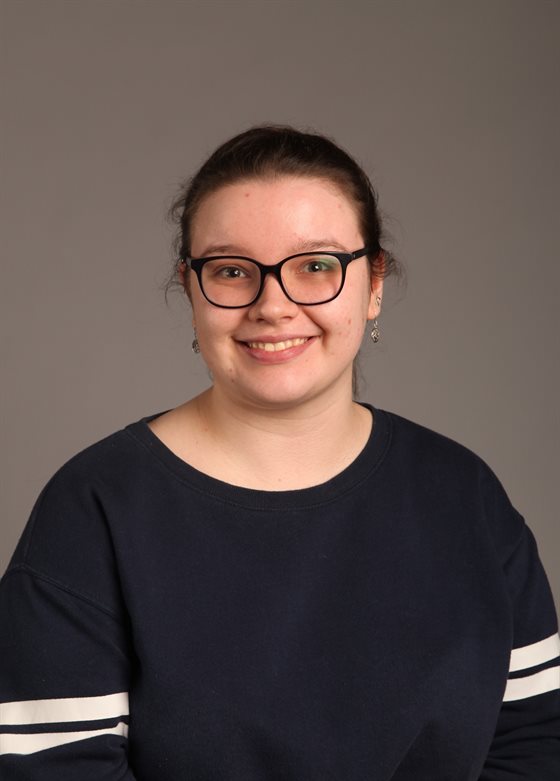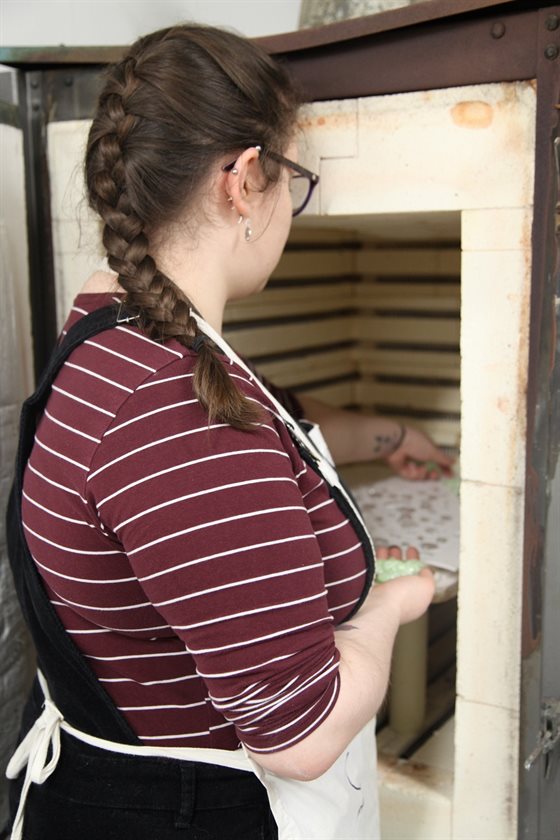An autistic designer at De Montfort University Leicester (DMU) is using the university’s artist in residency initiative to help her set up her own business.
Belinda King had never worked with glass before enrolling at DMU but soon found herself utilising the university’s kiln and other state-of-the-art equipment to great effect, creating intricate fused designs that impressed her tutors.

Belinda graduated with a first-class honours degree in Design Crafts BA (Hons) this summer and is just one of two students to be accepted onto the residency initiative from the cohort of 2021 graduates.
The artist in residency programme enables students finishing their studies to access the DMU’s workshops and academic support free of charge for a year.
She is now hoping the equipment available through the university programme will allow her the chance to create a portfolio of eye-catching pieces she can later sell online.
Belinda said: “There was a really big sense of relief knowing I got on to the programme because glasswork was something I really wanted to continue, but it can be difficult to find opportunities to use kilns or a hot shop.
“Now, through the residency programme, I can continue to use the equipment at DMU to help me pursue my goals. I have myself a part-time job so I can save for a kiln in my shed/workshop down in my garden shed, which will hopefully help me launch my own business.”
“When I first joined, I was too nervous to go in the workshop to try glass blowing because my Asperger’s can make me quite clumsy. I needn’t have worried though as my technician was always on hand reassure me that everything was okay, and from there my confidence grew.
During her year-long residency, Belinda will be focussing predominantly on weaving glass – a complex technique that involves creating waved glass stringers and alternating their placement so they overlap and lock in place before heating them together to fuse them into a permanent shape.
By using this technique, which she heavily researched during her final two years of university, the 24-year-old from Irthlingborough is hoping to create a range of unique and colourful wall pieces.
“What I love about glass is how far you can push its capabilities. With my work, I try and make the pattern in paper first so I know I can see if there are any design flaws and how long the stringers need to be before any glass goes into the kiln.
“I’m looking forward to starting weaving in the coming weeks and creating my first pieces. The woven glass pieces I have looked at during my time at university tend to be large wall pieces, so I’m hoping to do my own larger artworks.”

Less than a year before enrolling at DMU, Belinda was diagnosed with autism by chance when the doctor assessing her brother noticed signs of the condition in Belinda.
The diagnosis, while being a complete shock at the time, has not only inspired her art – her final year project was exploring ways to represent her condition in glass – but also helped drive Belinda to support other autistic students adapting to life at university.
She became an ambassador for the university’s Disability Advice and Support (DAS) team, talking to prospective students with autism about what support and initiatives are available to them through DMU, including workshops and access to Disabled Support Allowance.
Now she’s graduated from DMU, she is hoping to support the university in new ways, including offering advice on what a new support fund may offer disabled students on campus.
Belinda said: “I’m a twin, and while I have been diagnosed with Asperger’s, my sister Rebecca hasn’t. When my final project came around, I wanted to create a piece that represented our relationship.
“The colours I used were our favourites and the patterns in the fused glass portrayed our behaviour, so mine was very structured and the colours were because everything has to be organised for me. Rebecca is a lot freer in the way that she thinks, so her pattern is more eclectic to represent that.
“The pieces were designed to slot together. When I presented it as a complete work, she cried and took the piece that represents me, and I took her piece – it’s a nice way of keeping a little bit of her with me.
“I was very lucky with the treatment I received while I was at university. After my diagnosis, I was unsure if university was for me but DMU runs a residential specifically for autistic students called New to DMU and that helped me settle immediately.
“My journey ended up coming full circle because, in my second and third year, I was a student ambassador for the New to DMU residential, including the online versions. I have also worked the DAS stand on the open days, where I’m able to talk about the support available from a student perspective and explain the disabled student allowance, which enables mentors to help with different aspects of student life.”
Posted on Friday 29 October 2021